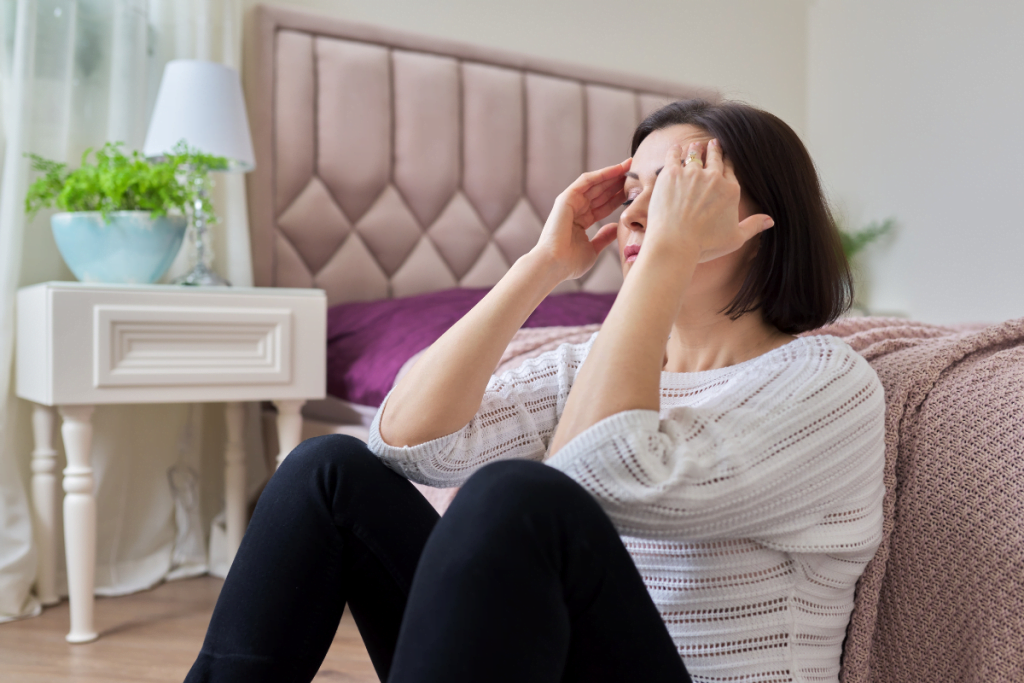Migraines and menstruation are two familiar yet highly disruptive experiences faced by many women. Understanding the connection between the menstrual cycle and migraines can be crucial in effectively managing these painful episodes. This article delves into how menstruation and migraines are related, the effect of menopause on headaches, and how birth control might impact headache patterns.
Menstrual Cycle and Migraines
Hormonal changes play a significant role in the onset and intensity of migraines, thereby creating a complex relationship between the menstrual cycle and migraines. Here are some key insights into this connection and its typical symptoms among women:
Hormonal Fluctuations
The main link between menstruation and migraines involves hormonal fluctuations. Estrogen and progesterone levels considerably affect the frequency and intensity of migraines. Right before menstruation, a drop in estrogen levels can trigger migraines in many women. This is known as menstrual migraine, which typically occurs two days before and three days after the onset of menstruation.
Symptoms and Triggers
Menstrual migraines often exhibit more severe symptoms compared to other migraine types.
These symptoms may include:
- Throbbing pain
- Nausea
- Vomiting
- Increased sensitivity to light and sound
Common triggers for menstrual migraines include:
- Stress
- Lack of sleep
- Certain foods
Managing Menstrual Migraines
Managing menstrual migraines can be challenging, but with the appropriate strategies, it’s possible to mitigate their impact on daily life. Here are some techniques to help:
Preventive Measures
Several strategies can help those experiencing menstrual migraines to prevent them. Maintaining a consistent sleep schedule, managing stress effectively, and avoiding known dietary triggers are essential steps. Keeping a migraine diary to track patterns and triggers can also aid in managing the condition more efficiently.
Medical Treatments
Medical treatments for menstrual migraines aim to minimize the frequency, severity, and duration of headaches associated with the menstrual cycle. Key options include nonsteroidal anti-inflammatory drugs (NSAIDs), triptans, and hormonal therapies.
NSAIDs, such as ibuprofen and naproxen, are commonly used to alleviate pain and inflammation related to menstrual migraines. These medications work best when taken at the onset of migraine symptoms or preventively, a few days prior to the expected start of menstruation.
Triptans are a class of medications specifically designed for migraines. Drugs like sumatriptan and rizatriptan target serotonin receptors to decrease inflammation and constrict blood vessels in the brain. These medications are generally used when NSAIDs do not adequately control the pain.
Hormonal therapies can stabilize the hormonal fluctuations that trigger menstrual migraines. Options include oral contraceptives, estrogen patches, or hormonal supplements. Continuous or extended-cycle birth control pills can decrease the frequency of menstrual migraines by shortening the hormone-free interval. For some women, applying estrogen patches during the menstrual cycle can help maintain steady estrogen levels and prevent migraine onset.
Headaches and Menopause
The transition into menopause can alter migraine patterns. Hormonal changes during this phase can see a rise or decline in migraine frequency, providing deeper insight into this stage and its potential impact on women’s health.
Hormonal Changes During Menopause
The onset of menopause brings substantial hormonal changes, which can influence headache patterns. For many women, the reduced levels of estrogen during menopause can lead to increased frequency and severity of headaches.
Types of Headaches
Postmenopausal women may experience various types of headaches, including tension headaches and migraines. While some women find relief from migraines after menopause, others might experience an increase in headache occurrences.
Management Strategies for Menopausal Headaches
Managing headaches during menopause often requires a combination of lifestyle changes and medical treatment. Regular physical activity, a balanced diet, and stress-management techniques can help relieve headache symptoms. Hormone replacement therapy (HRT) may be an option for some women, but it’s vital to consult a healthcare provider due to potential risks.
Contraceptive-Induced Headaches
Hormonal contraceptives such as birth control pills, patches, and intrauterine devices (IUDs) can affect headache frequency. The synthetic hormones in these contraceptives might cause hormonal fluctuations, leading to headaches for some individuals.
For women experiencing headaches due to hormonal contraceptives, various management options exist. Transitioning to a different contraceptive method, like a non-hormonal IUD or a barrier method, could help alleviate headaches. Additionally, low-dose hormonal contraceptives might reduce the severity of headache symptoms.
Key Takeaways
Recognizing the link between menstruation, menopause, and headaches is essential for effective management and treatment. Hormonal changes significantly affect the frequency and intensity of migraines and headaches in women. Identifying triggers and utilizing preventive strategies can help women better manage headache symptoms and improve their overall well-being.
When addressing headaches related to menstruation, menopause, or contraceptives, consulting healthcare professionals is crucial to determine the best treatment and management approaches.
Frequently Asked Questions (FAQs)
When does progesterone drop before a period?
Typically, progesterone levels decrease around 10 to 14 days after ovulation if pregnancy hasn’t taken place. When this happens, along with estrogen, it can trigger the uterine lining to shed, which results in menstruation. The drop in progesterone usually starts in the luteal phase, about a week before the period, which can lead to premenstrual symptoms.
Can birth control cause headaches?
Yes, birth control can cause headaches in some individuals. Hormonal fluctuations caused by the estrogen and progestin in birth control pills can lead to headaches or migraines, particularly during the placebo week when hormone levels drop.
When do ovulation headaches occur?
Ovulation headaches typically occur around the time of ovulation, which is usually midway through the menstrual cycle, about 14 days before the start of the next period. These headaches are thought to be triggered by the rapid changes in hormone levels, particularly the surge in estrogen and luteinizing hormone that occurs just before the ovary releases an egg.
Can birth control cause migraines?
Yes, birth control can cause migraines, especially in individuals who are prone to them. Birth control pills can affect the frequency and severity of migraines. Estrogen-containing birth control pills, in particular, can be a trigger for migraines due to fluctuations in hormone levels, especially during the hormone-free interval.
